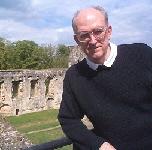Interview with Serge Bulat: Grappling with the concept of time
A new sound in the realm of electronic music is evolving from the mind of a transplanted Moldavan avant-garde composer now struggling to make his way in New York. He has based his recent work on “lounge electronica” but, he adds, “with a classical twist”.
 Serge Bulant, face painted
Serge Bulant, face painted
Serge Bulat, 30, a music-school product from post-Soviet Moldava, dropped his radio career and fled his homeland to seek artistic freedom in New York. “I wanted to be fully involved and unrestricted in what I'm trying to create,” he said in an extended series of email exchanges with me from his New York base.
Moldova, independent since the collapse of the Soviet Union in 1991, borders on Ukraine and Romania and has the distinction of being Europe’s poorest country.
His new album, “Queuelbum: A Music Guide to Time Travel” is now making its way among his fans on iTunes, Google Play, Spotify and other media. A CD version is in preparation and a video component is in the works. The title comes from his idea of living in a sort of constant queue. He cites among his influences Prokofiev and Stravinsky.
Bulat acknowledges feeling “very weird” when listening to one of the tracks, “Isolationist”. I found the entire album intriguing and stimulating, sometimes jolting, but not particularly weird – at least not compared to other experimental compositions out there.
Philip Glass, one of Bulat’s inspirations, once said music can only work if the listener doesn’t know what’s coming next. Bulat seems to have taken that advice to heart.
This three-pronged project includes his other primary video works: “Walker” and “Third World River”, the latter of which “expresses the concept in its full,” Bulat tells me. “Two entities communicate with each other, creating a special space. Eventually this contact becomes a piece of music/art.” Walker has an eerie message:
His video collaborator and sometime director is a Russian video artist Michael Rfdshir (a professional pseudonym that defies pronunciation in any language).
Bulat considers Queuelbum to be a personal introduction, “a sort of a throwback to the time when I existed in life’s waiting room, anticipating the future. Time is also transformation, so this is where the contrast and polarities appear.”
He has a philosophical bent that he combines with his music. I told him he sounds a lot like Dostoevsky. He did not disagree. Life, he believes, “is a waiting line, where past and present haven’t happened yet, a sort of a limbo ... where nothing exists yet, or everything exists already, but you can still chose where to go and what chance to take”.
He explains his thinking in this clip:
Bulat calls Queuelbum the beginning of his musical journey. His thinking emerges clearly in our email exchanges below.
Interview, full text:
Q. Where does your expertise in electronic music come from?
A. Back in Moldova, where I was born and raised, I worked in music and radio after I finished my piano studies. In my radio days I produced and hosted programs on arts and culture. I promoted the music unknown to us, from African to Bulgarian voices, all grounded in lounge electronica.
Q. What led you to leave Moldova and move to the West?
A. Well, Moldova has a decent cultural life, but artists have to struggle for progress and appreciation. I felt that if I wanted to be fully involved and unrestricted in what I'm trying to create, I needed to leave. This is how New York came in the picture. It’s a Mecca for artists.
Q. This new album seems to be a bit of a random compilation, right?
A. No quite. Queuelbum turned out to be this adventure of time and space, where I tried to connect my past and future via music. I have a wide spectrum of memories, from depression in my teens to grief over friends I lost as I got older, to happy moments, like playing your first tune and seeing Caribbean for the first time. I wanted to bring this together in melodies and rhythms. I tried to wake up that explorer in me. So, when you hear the tracks, you instantly differentiate what comes from one period or another.
Q. Is this some kind of time-travel in your head?
A. Yes, the idea comes from this weird concept of mine -- that you can communicate with yourself from the past to the future via music. Music creates memories but also lets you experience them again.
Q. How satisfied are you that a completely new sound emerges in the album?
A.It’s very hard to critique something you spent almost two years on, closed up in a home studio with no music influences whatsoever. That was my own choice – but I found the sound that makes the concept work, and it is new.
Q. Can you at least cite some influences in your thinking?
A. Influences are wide ranging. I'm book-nerdy, and love anything by Hesse, Pirandello, Gogol, Sartre, Borges, Murakami and Bulgakov. When was little I was fascinated by Belyaev – the Soviet sci-fi guru -- and later by the Bhagavad Gita.
Q. And music influences?
A. Classical and folk, mostly. I was raised listening to Moldavan folklore; I pretty much love anything Balcanic. This is why Goran Bregovic will be always in my heart. My hometown is the biggest gypsy town in Europe. But my true love is classical -- at this point, Puccini, Prokofiev, Stravinsky and Wagner. Modern influences vary, from UK triphop like Morcheeba, Massive Attack, Tricky and Zero 7 to American Thievery Corporation and Philip Glass. I’m also re-listening to a lot Nitin Sahney, Anoushka Shankar lately. Bjork’s “Vulnicura” is incredible.
Q. You describe yourself as an artist with strong philosophical interests. You sound somewhat Dostoevskian.
A. Well, in philosophical sense, I feel like Time is a spectacular antihero. If man is the true hero then time is this dark master, a powerful opponent who tends to win the battle.
Q. Why is Time so important to you? We all have to live with it, especially in our modern era.
A. I guess when you experience so much as I have, from sudden happiness to melancholy and sadness, time traveling is inevitable. You look for some form of escape. I have such strange and dark memories of my teens and childhood; from being isolated from the world and avoiding the sad reality of living in a ruined, post-Soviet society and the uncertainty of everyone’s future. I couldn’t wait to escape and live a better life, make music, but reality reflected hate, poverty and violence. So, isolation was that little spaceship that took me back and forth, past to future, to find those great times when I could live happily and do what I want.
Q. There seems to be poignancy in your music. Where does that come from, I wonder?
A. Yes, there is a longing for the moments in life that you can never relive. There is the first love, the wonder of a live performance, an epic road trip, the lost friendship, the last hug et cetera. All these moments have colors, tones, charged with energy, and ultimately, vibrations and sounds. If you zoom out, go back to the beginning of everything, then witness all stages of evolution, you realize that all the moments coexist –they keep happening over and over again. You get a feeling that Time is a strange force that makes no sense while still being the only logical thing when measuring life itself.
Q. What does this have to do with your new album ?
A. Queuelbum is the philosophical battle between the past and future. I am trying to create the meaning of all things, with Time as the only measure that makes sense in this world. Aside from benefits of living in the “now”, you develop a new understanding that nothing is “now” anymore; the “now” is the illusion that lies in fundamental understanding of what time is. Everything you say or do belongs to those polarities. We live in the world of memories of the past and future. And this is what this project is to me – this unit of memories, one contrasting with the other… but at the same time being whole and belonging to the same existence.
Q. You seem to have assembled a large band of collaborators.
A. No, everything you hear on Queuelbum is written, produced and performed by myself. I play piano and synthesizers. Most of the time I develop the melodies while playing piano. Composition makes more sense when I play it on the keys.
Q. What about your musicians?
A. The whole album is electronic, and whatever you hear is 100 percent digital. I wanted to produce a project with one tool and by one person only. The idea was to create a massive sound, structured and layered album, with pianos, organs, Tibetan bells, harps, woodwinds, percussion, and also make it sound like it was anchored in some other time -- 20 years ago or 20 from now in the future.
Q. You must have cut-and-pasted samples?
A. No, I didn’t use any samples whatsoever and tried to avoid the involvement of computers, so pretty much all production was done on my keyboard workstation. That makes up 75 percent of the record, and 25 percent is in the mixing. But I guess that’s why Queuelbum sounds the way it does. I squeezed everything I could out of my gear, even mixed inside the workstation.
Q. Your origins are East European. How international was this work?
It’s all done in my New York home although I did some experimentation with in a big Steinhardt studio with real instruments: cellos, oboe, flutes and piano, but I re-recorded everything myself on my synthesizer, as I didn’t see the point in leaving one track on the album grotesquely sounding live and real.
Q. Where could a curious listener find the full album?
A. As of today the record is everywhere from iTunes to Google Play and Spotify. In today's digital world, immediacy is the currency, so you can’t really have endless transitions/cross-faded tracks and make it organically fit in someone’s digi library. Queuelbum will be available in CD format very soon. I’m putting the physical version together now.
Q. Help me place this music among the electronic subgenres. You mentioned grounding in lounge-electronica. Is this album electro-grime, dark ambient, tech-trance?
A. I suppose genres have to be defined by other people. To me, it’s a meditation of neo-classical, ambient, but boosted with world beat and techno. I like calling it “electronic music with a classical twist”, but even then, I’m putting limitations on my own sound. Some songs are super-comprehensive and some are very avant-garde. But there is no formula; I like to be open in terms of sound.
Q. What tracks should a listener look out for?
A. “Queue Scope” is the big track -- pretty much the album’s signature track. “Isolationist” is one of my favorites -- very dominant and impulsive. It was initially a short interlude I planned for Queuelbum, but then it developed into a dark blockbuster. I still feel very weird while listening to this.
END
This article is brought to you by the author who owns the copyright to the text.
Should you want to support the author’s creative work you can use the PayPal “Donate” button below.
Your donation is a transaction between you and the author. The proceeds go directly to the author’s PayPal account in full less PayPal’s commission.
Facts & Arts neither receives information about you, nor of your donation, nor does Facts & Arts receive a commission.
Facts & Arts does not pay the author, nor takes paid by the author, for the posting of the author's material on Facts & Arts. Facts & Arts finances its operations by selling advertising space.




















